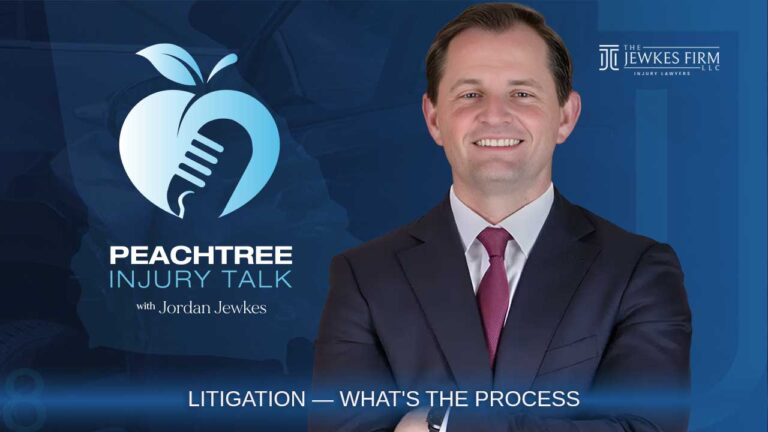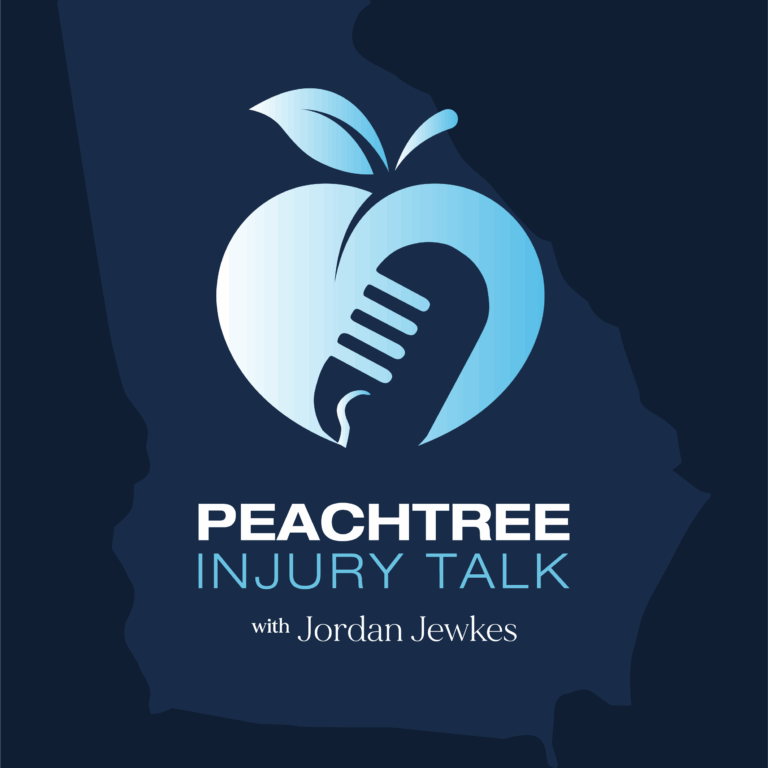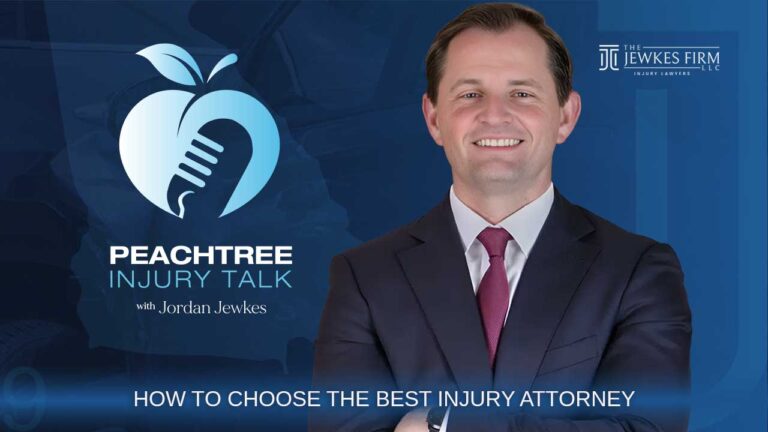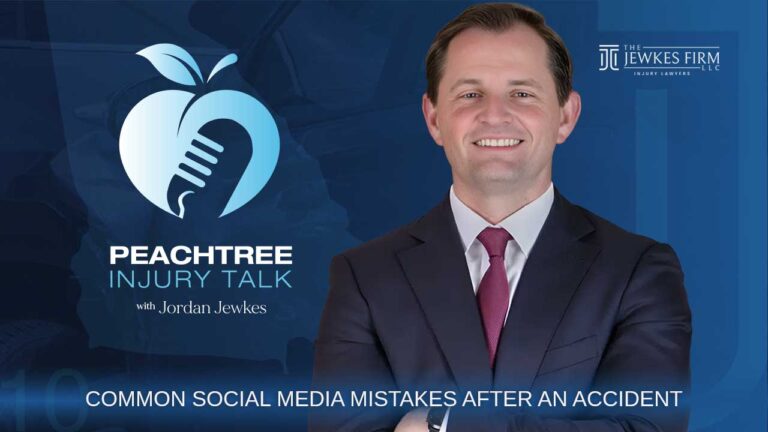
Litigation — What’s the Process and Why Does It Seem to Take So Long?
In this episode, Jordan Jewkes explains the litigation process, why it can be time-consuming, and what injured victims should expect when filing a lawsuit. He
Home | Podcasts | Peachtree Injury Talk | The Fine Line of Fault — How Comparative Negligence Shapes Your Personal Injury Case
Peachtree Injury Talk with Jordan Jewkes
In this episode of Peachtree Injury Talk, attorney Jordan Jewkes and host Katie Roberts explore the concept of comparative negligence and its impact on personal injury cases in Georgia. Jordan breaks down how fault is assessed, what percentage of liability can mean for a claim, and when it’s worth taking a case to trial. The discussion also covers real-life case examples, the importance of dash cams, and how insurance companies use comparative negligence in negotiations. If you’ve ever wondered how fault is determined in a car accident or what to do after a crash, this episode is a must-listen.
| 00:00 | Narrator: Welcome to Peachtree Injury Talk with attorney Jordan Jewkes. |
| 00:05 | Katie Roberts: Welcome to Peachtree Injury Talk with attorney Jordan Jewkes. Jordan strives to give injured victims a voice and provide strong advocacy against an often broken system. I'm your host, Katie Roberts, and today's episode is The Fine Line of Fault: How Comparative Negligence Shapes Your Personal Injury Case. Thank you so much for being here today, Jordan. |
| 00:32 | Jordan Jewkes: Thanks, Katie. I'm really looking forward to being here. Despite how it may sound, this is actually really cool stuff. I think it’s interesting. |
| 00:39 | Katie Roberts: So I have a question to kick us off. I'm not well-versed in personal injury law—can you explain what comparative negligence means in the context of PI law in Georgia? |
| 00:53 | Jordan Jewkes: Absolutely. Comparative negligence is one of those legal terms that makes people go, “Wait, what?” But to break it down—it means that when someone is injured and makes a claim, they may bear some responsibility for how they got injured. In other words, they might be partially at fault for the incident. A classic example is speeding. If someone was speeding at the time of a car wreck, a comparative negligence argument could be made that, because they were breaking the law, their damages should be reduced. They're not blameless. |
| 01:47 | Katie Roberts: Interesting. So is comparative negligence something you look at right away when taking a case, or does it come up later during review? |
| 02:07 | Jordan Jewkes: Good question—and the answer is yes to both. First, you need to understand how the law works. Georgia follows what's called modified comparative negligence. If the injured person—what we call the plaintiff—is more than 50% at fault, they cannot recover anything. So if the plaintiff is deemed more responsible than the defendant, even 51%, they’re barred from recovery altogether. It’s a hard line. Let’s say someone rear-ends another vehicle. The law generally wouldn’t allow that person to sue the driver they rear-ended for damages, because they’d likely be considered more than 50% at fault. |
| 03:23 | Katie Roberts: Is there a standard method for assigning those percentages? Or is it up to each firm to assess that? |
| 03:43 | Jordan Jewkes: There’s no universal scale. The law just says the plaintiff can’t have the greater share of fault. But the only party that can make a binding decision about that percentage is a jury. So, for example, if I take a case thinking my client isn’t more than 50% at fault, we could go to trial and a jury might still say, “We think she’s 60% at fault.” That’s binding. It doesn’t matter how serious the injury is—if the plaintiff is more than 50% responsible, they get nothing. |
| 04:42 | Katie Roberts: So if you’re unsure whether your client falls below that 50% threshold, do you recommend against going to trial? |
| 04:47 | Jordan Jewkes: It depends, but yeah, you're thinking along the right lines. If fault is a big question mark, we’re taking on more risk. We often rely on our instincts early on, but those instincts are refined over time with experience. What we know on day one is usually very different than what we know on day 20 after investigation. But if I think we’re right on that 50/50 line, I’ll have a direct conversation with the client. I’ll explain that we may invest a lot of time and resources and still end up with no recovery. It’s high-risk, high-reward. |
| 06:22 | Katie Roberts: That’s fascinating. Especially when you factor in the client’s injuries and the cost of fighting a complex case. You have to weigh whether it's worth the effort. |
| 06:45 | Jordan Jewkes: Exactly. If the injuries are minor and we’d need to put extensive time into proving lack of fault, we may decide it’s not worth it. But if the injuries are serious and there’s an argument over who ran the red light, that might be worth fighting. Each case is different. We’ve taken cases other firms passed on—either because they don’t specialize in personal injury or they only want easy wins. We don’t mind a fight if we see a path to helping the client. |
| 07:20 | Katie Roberts: Jordan, I have to say—you’re selling yourself short calling these gut reactions. You’ve got years of experience and knowledge that help you make those calls. |
| 07:38 | Jordan Jewkes: Well, thanks. There’s definitely a lot of experience behind the instinct. Over time, you get better at making those judgment calls quickly—especially when there’s no video, no eyewitness, and unclear facts. But sometimes we can talk to a police officer or find video evidence that clears things up. We’ve had cases where the police report didn’t assign fault, but the officer later gave sworn testimony that helped us prove the defendant was to blame. So it’s about digging in and knowing what to look for. |
| 00:00 | Katie Roberts: That makes sense. So let’s say I’m in a car accident. I don’t know who was at fault, and I’m badly injured. What’s the first thing I should do? |
| 00:00 | Jordan Jewkes: Good question—and one I get asked a lot. First, take care of yourself. Call 911, get medical attention, take photos of the scene, and document what you can. Those early details matter. But one of the biggest don’ts is: don’t admit fault. Don’t say “sorry.” Even a well-meaning comment can be used against you. Let the investigating officer do their job. We had a case where our client was rear-ended. She wasn’t at fault—she stopped safely at a green light because the car in front of her did something strange. But she got out and apologized. That one sentence became part of the defense’s argument that she was comparatively negligent. They even filed a legal notice claiming that a non-party—the car that stopped and drove off—was the real cause. That made the case much more complex. |
| 00:00 | Katie Roberts: That’s wild. I’ve heard of people staging accidents too—brake-checking or using another car to cause a crash. Do you see that? |
| 00:00 | Jordan Jewkes: Not often. I’ve seen those TikTok videos, and they’re unbelievable. Like the one where a car pulls in front of another, slams on the brakes, and when they’re not hit, puts the car in reverse and rams the vehicle behind them—then pretends to be injured. That’s a textbook case of fraud and 100% comparative negligence. No recovery for them. But those cases are rare. I’ve never knowingly represented anyone faking an injury. |
| 00:00 | Katie Roberts: Do you recommend everyone have a dash cam? |
| 00:00 | Jordan Jewkes: Yes. Absolutely. Dash cams are relatively cheap, easy to install, and they capture critical evidence. I’ve seen cases where a dash cam made fault crystal clear—whether in a crash or a traffic stop. If you drive a lot, it’s a smart investment. |
| 00:00 | Katie Roberts: I’m in Dallas. Crazy drivers everywhere. I’m ordering one this afternoon. |
| 00:00 | Jordan Jewkes: Good call. A dash cam can be the difference between winning and losing a case. |
| 00:00 | Katie Roberts: How do insurance companies handle situations where both parties share some fault? Are settlements usually fair? |
| 00:00 | Jordan Jewkes: Insurance companies love claiming comparative fault. It's one of their go-to tactics in negotiation. They’ll say, “Your client is 25% at fault,” and that number is often arbitrary. I always remind clients—adjusters don’t decide fault. Juries do. I can give my best professional opinion, but until a jury weighs in, no one knows for sure. |
| 00:00 | Katie Roberts: In a perfect world, how does comparative negligence affect damages like pain and suffering or emotional distress? And how does it work in multi-car accidents? |
| 00:00 | Jordan Jewkes: Good questions. For damages—let’s say the jury finds total damages of $10,000. If they also find the plaintiff 25% at fault, they subtract that from the total. So the client would recover $7,500. With multi-car accidents, it gets more complex. You need a detailed investigation. Often in chain-reaction crashes, the last car is mostly at fault for triggering everything. But every case is unique. Sometimes we have to sue multiple people and let them point fingers at each other—just not at our client. |
| 00:00 | Katie Roberts: I feel like we could do a whole episode just on multi-car collisions. |
| 00:00 | Jordan Jewkes: We probably could! If someone’s unsure about fault or suspects multiple drivers were involved, the best thing to do is talk to an experienced attorney right away. The longer you wait, the harder it gets to preserve evidence and make your case. |
| 00:00 | Katie Roberts: It all comes back to what you said earlier—act quickly and gather everything you can at the scene. Jordan, this has been so informative. I really appreciate your time today. |
| 00:00 | Jordan Jewkes: Thanks, Katie. I enjoyed it. And if anyone has questions or needs help, give us a call. We offer free consultations. |
| 21:13 | Katie Roberts: Absolutely. And to everyone watching, thank you for tuning in to Peachtree Injury Talk with attorney Jordan Jewkes. For more information or to connect with Jordan, visit jewkesfirm.com (https://www.jewkesfirm.com). Be sure to hit that like and subscribe button, and leave us a review in the comments. See you next time. |
| 21:32 | Jordan Jewkes: Thanks. |
| 21:33 | Narrator: Thanks for watching. Be sure to hit that like and subscribe button and leave us a review in the comments. |

Peachtree Injury Talk is a podcast by Kevin Rosenquist featuring legal insights and practical advice from Georgia-based attorney Jordan Jewkes. The show focuses on personal injury law, offering listeners expert guidance on navigating insurance claims, understanding legal processes, and protecting their rights after an accident. Each episode dives into real-life case examples, common challenges injured individuals face, and actionable tips for dealing with insurance companies and legal hurdles.
Episode Summary
In this episode of Peachtree Injury Talk, attorney Jordan Jewkes explains how if you’re injured as a passenger in a car accident, you usually aren’t at fault—and that gives you strong rights. You can file a claim against the at-fault driver, the driver of your own vehicle (even if it’s a friend), or both if they share fault. While technically claims name individuals, insurance companies typically pay. If both drivers deny responsibility, a lawsuit might be necessary to sort out fault.
To protect yourself financially, purchase uninsured/underinsured motorist coverage (UM/UIM)—it’s cheap and travels with you. And if you’re nervous about filing against someone you know, remember: insurance is there to cover exactly these situations.
Timestamps
00:00 – Introduction to passenger injury claims
00:31 – Who passengers can file claims against
02:04 – Filing claims against drivers vs insurance
03:39 – Shared fault and lawsuit implications
06:14 – Understanding large verdicts and misconceptions
11:50 – Uninsured motorist coverage importance
14:15 – Filing claims against friends or relatives
16:38 – Closing remarks and contact info
About the Show
Peachtree Injury Talk is hosted by attorney Jordan Jewkes, who is dedicated to giving injury victims a voice and fighting for their rights against an often unfair system. Each episode provides valuable legal insights and practical advice for those navigating personal injury claims.

The Fine Line of Fault — How Comparative Negligence Shapes Your Personal Injury Case breaks down the key legal doctrine of comparative negligence in Georgia personal injury (PI) law. Jordan explains that comparative negligence acknowledges that injured plaintiffs may share some responsibility for their own injuries, which affects their ability to recover damages.
Jordan details Georgia’s modified comparative negligence rule, under which a plaintiff cannot recover damages if they are found more than 50% at fault for the accident. This legal threshold is critical—if a jury assigns the plaintiff 51% or greater fault, the claim is barred, regardless of injury severity. This “hard line” significantly influences case strategy and client expectations.
Katie asks how fault percentages are determined. Jordan clarifies there is no universal formula; only juries can make a binding determination. This introduces uncertainty and risk, especially in cases near the 50/50 fault divide. Jordan emphasizes the importance of early instincts, refined by ongoing investigation, and advocates transparent discussions with clients about the possibility of no recovery to ensure informed decision-making about pursuing or settling a case.
Jordan offers practical steps for individuals involved in accidents: seek immediate medical attention, document the scene with photos, and importantly, avoid admitting fault or apologizing at the scene, which can be used against them. He shares an example where a client’s apology became a key defense argument asserting comparative negligence.
The conversation highlights the critical role of evidence in proving fault. Jordan strongly recommends dash cams as affordable, easy-to-install tools that can provide clear, unbiased footage resolving disputed circumstances. While staged or fraudulent accidents exist, Jordan notes these are rare and he does not represent fraudulent claimants.
Jordan explains insurance companies often assert arbitrary fault percentages during negotiations to minimize payouts. He reminds viewers that fault allocation is ultimately a jury determination and cautions clients to be wary of lowball offers based on comparative fault claims. Damages are reduced proportionally—e.g., a 25% fault assignment reduces a $10,000 award to $7,500.
The discussion briefly covers multi-car collisions, where fault assessment becomes more complicated and may involve multiple defendants blaming each other. Jordan stresses the necessity of detailed investigations and early legal consultation to preserve evidence and properly advocate for clients.
Throughout the episode, Jordan highlights the uniqueness of each case, the value of experienced legal counsel, and the importance of acting quickly after an accident. Katie closes by encouraging viewers to seek free consultations for personal injury concerns, reinforcing that comparative negligence is complex but manageable with the right guidance.
This episode offers clear, accessible explanations of comparative negligence law, practical tips for accident victims, and insights into the legal and strategic challenges injury attorneys face. It empowers listeners to better understand fault’s “fine line” and make informed decisions when pursuing personal injury claims. For more information, reach out to The Jewkes Law Firm at (770) 771-5130.
This show is designed to deliver general information regarding the law. Our guests will not provide tailored legal advice. If you have a personal issue and need legal support, get in touch with us for a free consultation with a Jewkes Firm attorney.
Subscribe to our newsletter for essential updates and expert legal advice.

In this episode, Jordan Jewkes explains the litigation process, why it can be time-consuming, and what injured victims should expect when filing a lawsuit. He

In this episode of Peachtree Injury Talk, attorney Jordan Jewkes discusses the important factors to consider when choosing the best injury attorney. Jordan emphasizes the

In this episode, Jordan Jewkes dives into the risks and mistakes associated with social media use after an auto accident. Jordan explains how social media
The information you obtain at this site is not, nor is it intended to be, legal advice. You should consult an attorney for advice regarding your individual situation. Contacting us does not create an attorney-client relationship.
